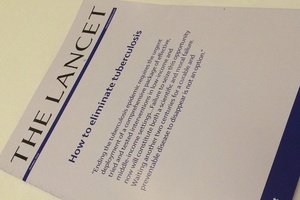A paradigm shift needed in the way we fight TB
Launch of the Lancet TB Series on 'How to Eliminate TB': Unless there is a major shift in the way the world fights tuberculosis - from a reliance on biomedical solutions to an approach that combines biomedical interventions with social actions - the epidemic and drug resistance will worsen.
27 October 2015 – The 26th of October was a momentous day in Dubai. Under the overarching title ‘Stopping the Body Count: A Comprehensive Approach to Move Toward Zero Tuberculosis Deaths’ and in the presence of key stakeholders, country representatives and partners, the Lancet has launched a series of manuscripts which describe a comprehensive approach to drive down TB incidence far faster than current global rates of decline. By implementing these interventions we will reach the targets of the Global Plan to End TB 2016-2020 and further the 2035 End TB Strategy targets. The authors presented on topics from the manuscripts including active case-finding and prompt initiation of effective TB treatment, treatment of latent TB infection,addressing the biosocial determinants of the disease, and using programme data to target and monitor interventions.
The same day also saw the launch of Zero TB Cities: Building Community-Based Health Care Delivery
Models for the 21st Century - a collaborative initiative geared toward significant,
accelerated reductions in tuberculosis mortality and prevalence
in high-burden metropolitan areas. The Stop TB Partnership is
one of the main partners and supporters of the project, together
with Harvard Medical School and Partners in Health and others,
building on the previous work of TB REACH and ongoing engagement
with other partners. The meeting was co-sponsored by
Harvard Medical School, Harvard Medical School Center for Global
Health Delivery – Dubai, the Stop TB Partnership and
Advance Access and Delivery.
The meeting was preceeded by the launch of the Center for the
Global Health Delivery - Dubai/Harvard Medical School on 25th
October 2015.
Dr Lucica Ditiu, Executive Director of the Stop TB Partnership,
presenting in Dubai said, “I applaud the
Lancet and the authors of the articles, starting with our
colleagues and friends from Harvard Medical School and Partners
in Health for publishing the TB Series on “How to Eliminate TB”. I hope these articles will become mandatory reading for
students, professionals, and everyone working on TB. TB
incidence is going down too slow, prevalence surveys are showing
that TB numbers are higher than the estimates, our
TB mortality figures are increasing and reach unacceptable
high levels, so can we take action – it is already
late , with every hour that pass. Taking action means we
need to change the way we do and think about TB. We need
a Paradigm Shift, and the launch of this series
comes in advance of the launch of the Global Plan to End TB
2016-2020 which outlines the need for change. Unless we use sub
national and dis-aggregated data to drive our programmatic
intervention and prioritization, unless we speak about active
case finding, X-Ray, contacts, treatment of latent TB infection,
the social determinants of TB, unless we speak prevention and
Transmission, and unless we put the people affected by TB
at the core of our work – we will not change anything and
we will not reach our targets. This is why, I am so honored to
be here today – because of the Lancet series, because of
the Zero TB Cities Project. I am convinced that the Zero TB
Cities Project will show the world that we can move faster in
TB, that we must have hope that we can eliminate TB".
'The aim of the Harvard Medical School Center for Global Health
Delivery - Dubai is to support research, training, and politics
that address important health delivery gaps. We are launching
the Lancet Series here because it provides a road map for
filling a gap that continues to kill almost two million people a
year. This series -- and the Zero TB Cities project that has
been created in tandem with it -- provides a path that will help
us stop the tuberculosis epidemic at a much faster pace than we
have achieved to date,' said Dr Salmaan Keshavjee, Director of
the Harvard Medical School Center for Global Health Delivery -
Dubai and an Associate Professor of Global Health and
Social Medicine at Harvard Medical School.
'The Lancet Series is a response to the fact that business as
usual can no longer be an option in the fight against
tuberculosis. Often the message is that TB is too complex, or
that newer technologies are needed. But as this Series shows,
there is not reason not to use existing interventions that do
work or can stop the epidemic. Despite the evidence, there is a
gap between data and implementation. The policy and
implementation frameworks that have been adopted in the past
decades have just not worked,' said Pam Das, Senior Executive
Editor for the Lancet and a key author in this series.
Source:
Stop TB Partnership


